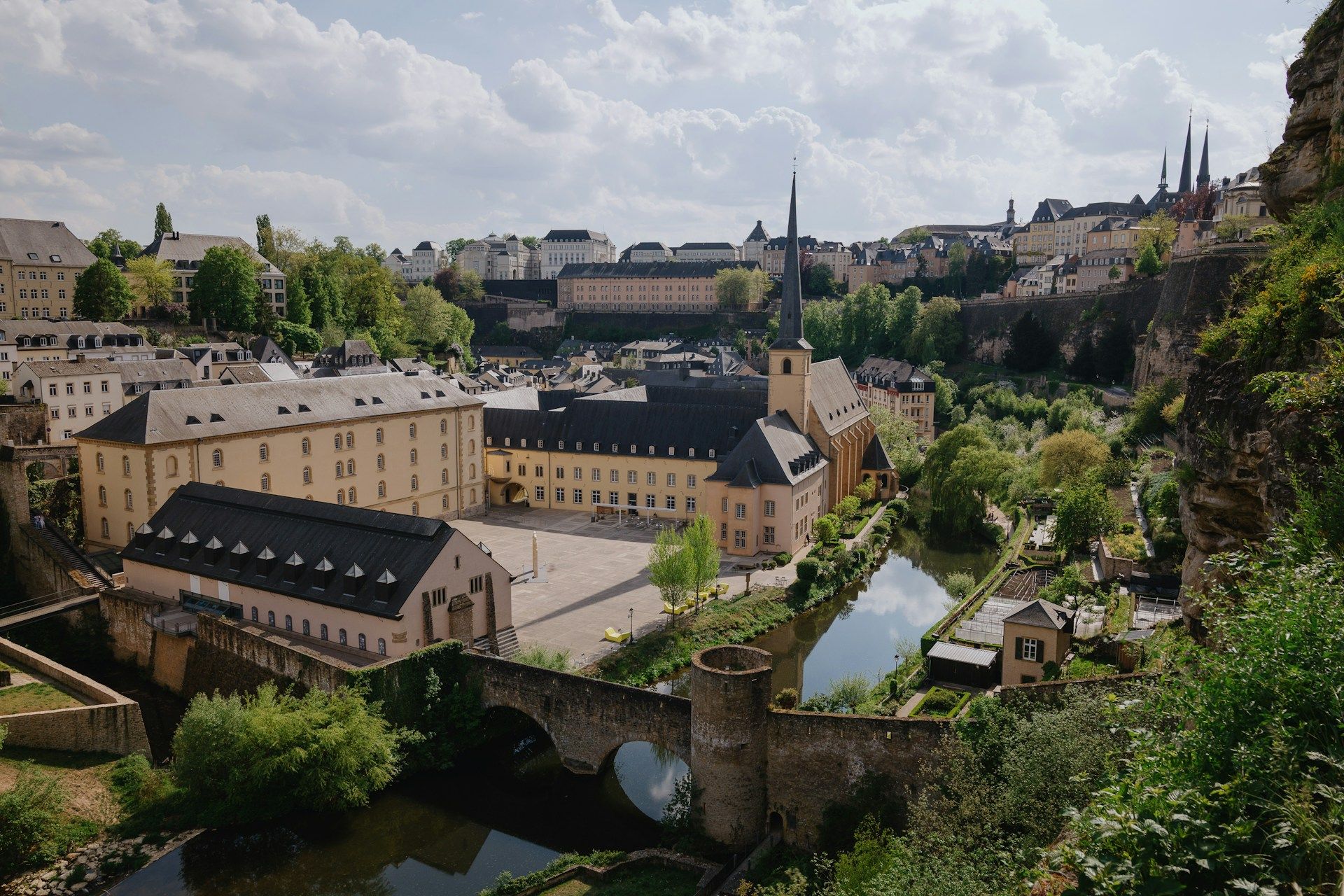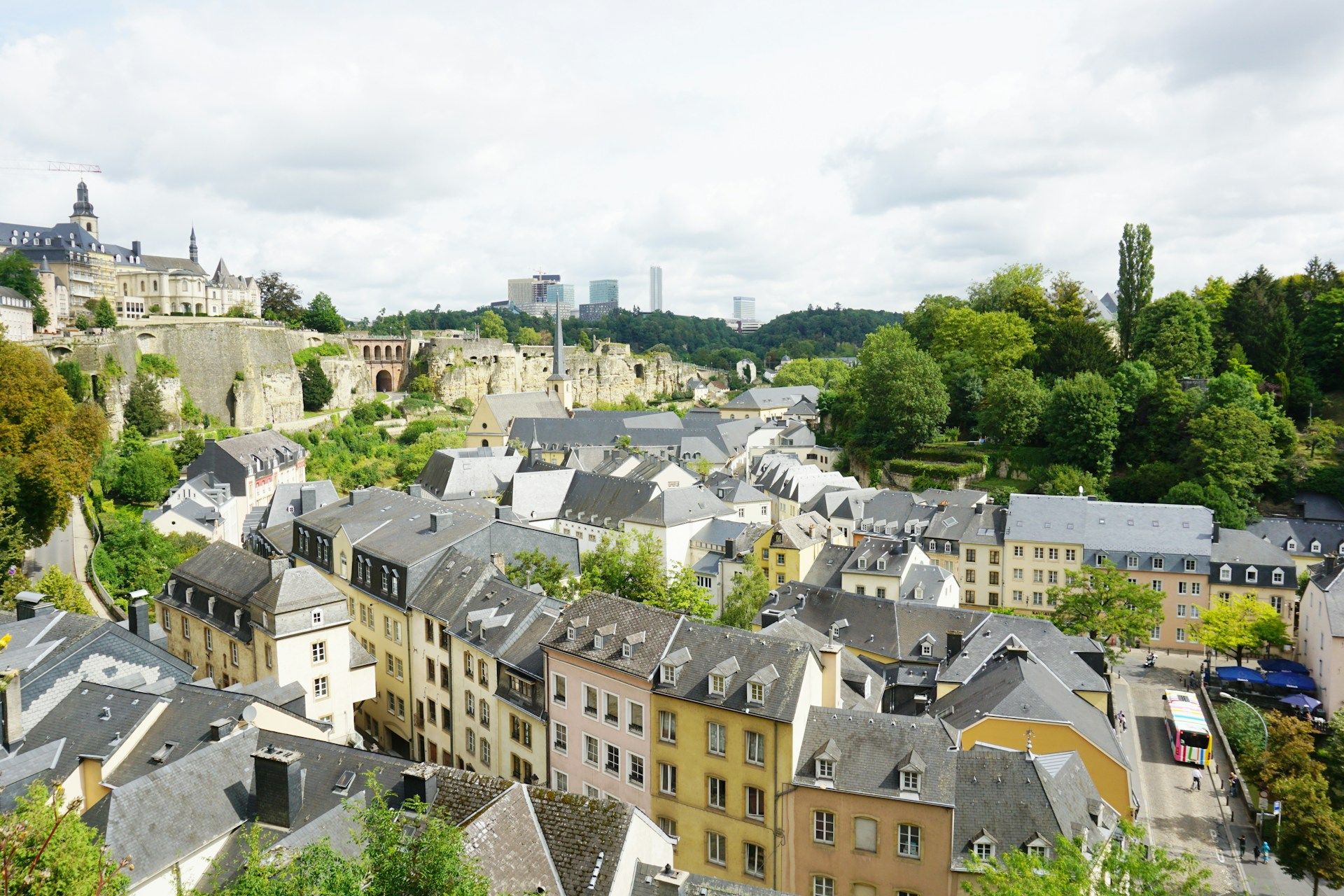CHAT
WITH US
WITH US
GET A
QUOTE
have questions? call us
+44 3330 907053

Moving Guides • Europe • 24 Feb 2025
Share this article
Luxembourg, despite being one of Europe's smallest countries, offers distinct regions and communities to consider when relocating. Your choice of location will significantly impact your experience, from daily commutes to community integration.
Luxembourg City, the capital, hosts most international companies and institutions, making it the natural choice for many professionals. The city divides into distinct quarters, each with its own character. Kirchberg houses European institutions and financial companies, while Grund and Clausen offer historic charm with modern amenities. The city centre provides excellent facilities but comes with premium property costs.

Outside the capital, consider areas like:
Key location considerations include:
Post-Brexit, UK citizens need appropriate permissions to live in Luxembourg. Visit the Official Luxembourg Government Portal for detailed information about visa categories and application processes.
For stays beyond 90 days, you'll need to apply for:
Common residence permit categories include:
Documentation typically required:
Most applications require submission to the Luxembourg embassy in London before arrival, with processing times of 3-4 months common.

Luxembourg's property market ranks among Europe's most expensive, particularly in Luxembourg City. Start your search early through reputable sites like AtHome or engage a relocation specialist.
Renting in Luxembourg involves understanding several local practices:
When viewing properties, assess:
Required documentation for renting typically includes:
Luxembourg boasts an excellent healthcare system, consistently ranking among Europe's best. As a resident, you'll participate in the national health insurance system (CNS - Caisse Nationale de Santé).
Initial healthcare steps include:
The Luxembourg healthcare system operates on a reimbursement model - you pay upfront for most services and submit claims for reimbursement (typically 80-90% of costs). Many residents also purchase complementary insurance (assurance complémentaire) to cover the remaining portion.
Healthcare documentation to prepare:
The Luxembourg job market offers opportunities in finance, EU institutions, technology, and professional services. Language skills significantly impact job prospects, with many positions requiring French, German, or Luxembourgish in addition to English.
Work permit processing integrates with residence permit applications. Key employment considerations include:
Luxembourg's multilingual environment may require certification of language skills. The Lifelong Learning Portal offers resources for language and professional development.
Luxembourg's sophisticated banking sector makes financial setup relatively straightforward, though more documentation is required post-Brexit. Major banks like BGL BNP Paribas, Banque et Caisse d'Épargne de l'État (BCEE), and ING offer comprehensive services with English-speaking staff.
Opening a bank account ideally begins before arriving, as many initial expenses require local bank transfers. Some banks offer remote account opening for UK citizens with job contracts in Luxembourg, though you'll need to visit in person to complete the setup process.
Essential banking requirements include:
Consider these factors when choosing your bank:

Luxembourg's tax system differs significantly from the UK and requires careful understanding. While the headline tax rates appear high, various deductions often reduce effective rates substantially. The Luxembourg Tax Authority provides comprehensive information about tax obligations.
As a new resident, you'll need to:
Key tax considerations include:
Many expatriates engage tax professionals during their first year to ensure compliance and optimise deductions.
Relocating possessions to Luxembourg requires careful planning, especially post-Brexit. As a third-country national moving to an EU state, you'll need specific documentation to import personal effects duty-free.
The logistics of moving depend on your household size and specific requirements. Luxembourg's central location makes road transport from the UK feasible, typically taking 2-3 days door-to-door.
Essential moving documentation includes:
Consider these factors when planning your move:

Upon arrival in Luxembourg, several registration procedures require attention within specific timeframes. The sequencing of these registrations is important, as some processes depend on completion of others.
Your first step involves declaration of arrival (déclaration d'arrivée) at your local communal administration (commune) within three days of arrival. This initiates your official residence in Luxembourg and enables subsequent registrations.
Essential registration processes include:
Required documentation typically includes:
Establishing utilities and services in Luxembourg is generally efficient but requires understanding local providers and practices. Most utility companies offer English-language support, particularly in Luxembourg City and surrounding areas.
Essential services to arrange include:
When establishing services, you'll typically need:
Internet services in Luxembourg offer excellent speed and reliability, with fiber connections widely available in urban areas. Setup typically takes 1-2 weeks, so consider temporary solutions during your initial arrival period.
Luxembourg offers exceptional public transport, which has been completely free throughout the country since March 2020 - the first nation in the world to implement such a policy. This complements the country's focus on sustainable mobility and helps offset traffic congestion issues.
The public transport network integrates buses, trains, and the new tram system in Luxembourg City. The Mobilité Luxembourg website provides comprehensive journey planning across all transport modes. Despite excellent public transport, many residents still rely on cars, particularly those living in rural areas or commuting across borders.
Key transport considerations include:
If bringing your vehicle from the UK, you must register it in Luxembourg within six months of establishing residency. This process requires:
Luxembourg's multilingual environment presents both challenges and opportunities. The country has three official languages: Luxembourgish (the national language), French (used for legislation), and German (common in media). English is widely spoken in business, particularly in the financial sector and international companies.
Learning basic Luxembourgish demonstrates integration commitment and is appreciated in daily interactions. French proves most useful for administrative matters and daily life, while German helps with broader cultural integration. The National Institute for Languages offers courses in all national languages.
Language considerations include:
Many communes offer subsidised language courses for new residents, and some employers provide language training as part of relocation packages.
Luxembourg's climate resembles that of southern UK but with more pronounced seasons - colder winters and warmer summers. Preparing properly for seasonal changes ensures comfort throughout the year.
Winter temperatures regularly drop below freezing, with occasional snowfall requiring appropriate clothing and home preparations. Summers can be surprisingly warm, with temperatures sometimes exceeding 30°C.
Seasonal preparations include:
Understanding energy efficiency becomes particularly important given Luxembourg's relatively high utility costs. Many buildings feature modern energy-saving technologies, but older properties may require additional measures to maintain comfort efficiently.
Building a social network proves essential for successful integration into Luxembourg life. The country's international character means numerous opportunities exist for connecting with both locals and fellow expatriates.
Luxembourg City hosts a particularly diverse international community, with organised groups catering to various interests and nationalities. The Meetup platform offers numerous special interest groups, while the British Ladies Club provides activities and support specifically for UK expatriates.
Social integration opportunities include:
Luxembourgish culture values privacy and reserve, so building relationships may take time. Participation in local festivals and community events helps establish connections beyond the expatriate bubble.
Ready to start your Luxembourg journey? Deliver1 specialises in UK to Luxembourg relocations, offering comprehensive services tailored to this unique destination. Our expertise ensures your transition proceeds smoothly, with support available throughout your move.
Our Luxembourg relocation services include:
Contact our Luxembourg relocation specialists at for a personalised quote and comprehensive support. We understand the unique challenges of moving to Luxembourg and provide the expertise needed to ensure a successful relocation.
We love hearing from you-so please get in touch with any questions or queries.
We love hearing from you-so please get in touch with any questions or queries.
Working hours
Mon - Sat: 08:00 - 17:00
Sun: Closed
Call
+44 3330 907053Location
Unit 3, Newyears Green Lane
Newyears Green
Uxbridge
UB9 6LX
United Kingdom
